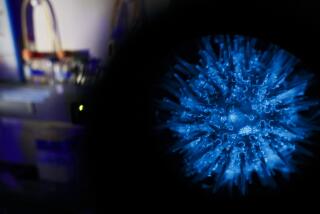Q&A;: Richard Dawkins discusses evolution, religion and his fans
Richard Dawkins was enjoying a coffee at the Mondrian Hotel when a star-struck waiter interrupted him to thank him for his work. It was the kind of thing that happens a lot at the swanky West Hollywood hot spot — but usually to showbiz celebrities, not biologists.
Dawkins is used to the adulation. The British intellectual has become a celebrity thanks to his books on evolution — including “The Selfish Gene,” written in 1976 — and his vocal atheism, expressed in works like “The God Delusion,” published in 2006. His latest offering is the first volume of his new autobiography, “An Appetite for Wonder: The Making of a Scientist,” which describes his childhood in colonial Africa and his early scientific work.
Dawkins talked with The Times about his writing, his fans and what people do and don’t understand about evolution.
You have a lot of readers who are not scientists.
Yes. I would like people to appreciate science in the same way they appreciate the arts. Science has a timeless quality to it.
The usefulness of science is sometimes exaggerated. You’d never talk about music being useful, or art being useful.
People do talk about music being useful, as a tool for training the brain.
They do, that’s true. If you’re really struggling to find something to say, that’s what you’d come up with. It’s not quite as bad as saying it’s useful because it’s good exercise for the violinist’s right arm.
But music is beautiful, music is inspiring. And so is science. I’m of the Carl Sagan school of science writing — it should be beautiful and inspiring and enthralling and thrilling. Because reality is all those things.
We are privileged to be in reality. We get here by a process which happens to be my subject — evolution, Darwinian evolution — and the fact that we understand how we got here is itself wonderful.
Do you think people understand evolution?
Jacques Monod, the great molecular biologist, said that the trouble with natural selection is that everyone thinks he understands it.
It’s a simple idea. And yet, simple as it is, nobody thought of it until the 19th century, which is remarkable when you think of what clever things had already been thought of in mathematics and physics. On the face of it, it would seem to need less cleverness to think of natural selection than to think of Newton’s Laws, the mathematics of Archimedes or Pythagoras, or the astronomy of Galileo or Kepler.
How do you define natural selection?
That the bodies that survive are the ones that are good at surviving, and they pass on the genes that made them good at surviving.
Some living things stay planted in the ground, like trees. Some fly, some hop, some run, some dig, some climb, some eat animals, some eat plants. All are doing the same thing fundamentally, which is preserving and propagating the genes that made them do it and allowed them to survive.
It’s why animals and plants look so beautifully designed — although with flaws and shortcomings, which are themselves revealing. They are flaws and shortcomings which no “intelligent designer” would ever have built in.
What do people misunderstand about natural selection?
In many cases they think that living, surviving animals turn into other surviving animals, as in: “I’ve never seen a dog turn into a cat,” or “I’ve never seen a monkey turn into a man.”
Another common misunderstanding: They also fail to realize that evolution is terribly slow. People want to see it happening before their eyes.
One of the difficult things to get across to people is how immensely long it takes. That may be why it took so long for Darwin to arrive on the scene. People are not used to things grinding out over such a long period of time.
Has scientists’ understanding of evolution improved since Darwin?
It has definitely improved. I suppose the biggest change was the importing of Mendelian genetics into evolution. People realized that Darwinian natural selection had to be interpreted as changes in frequencies of genes. The best genes become more frequent in the gene pool.
Genes are sitting in bodies at any one time. But because of sexual reproduction they jostle with each other and vie with each other to get into the next generation’s gene pool.
The frequencies of genes in the gene pool change as generations go by, and that is evolution. That was a big leap forward.
Do you get to interact much with readers of your books?
Yes — I meet hundreds of people in book signing queues, and they nearly all say something nice as they get their book signed.
I find that moving and humbling. Some say, “I became a scientist because I read ‘The Selfish Gene’” — quite a lot say that actually. Some say, “I gave up religion when I read ‘The God Delusion,’” or “I’d already given up religion, but you gave me the courage to say so.”
Can science and religion coexist?
Obviously they can, because they do — in the same individual brains, in many cases. But I personally find it mysterious that they do.
Do people ask you about that a lot?
All the time, yes. I get a bit fed up with it.
What scientific work are you particularly interested in today?
I’m fascinated by the idea that genetics is digital. A gene is a long sequence of coded letters, like computer information. Modern biology is becoming very much a branch of information technology.
What do you think of projects that sequence entire genomes? Can having all that data change the study of molecular biology and evolution?
I think they’re fascinating. Genome sequencing has changed taxonomy. Darwin relied on comparative anatomy — how organisms’ bodies differed — to know that we were closer to African apes than to Asian apes.
Nowadays you can do the same thing, but by comparing DNA. It’s hugely more data to work from. You really can compare letter by letter. The complete tree of life should be gettable, if only we could sequence everything, and that’s limited only by money and time.
What have we learned about evolution by studying genes?
There have been some surprises. One was the discovery through genetic evidence, a decade or so ago, that whales come off from right in the middle of the cloven-hoofed animals. They’re especially close cousins of hippos.
At some point there was a branch, and the hippos went one way, and a similar animal went the other way, into the sea. All the other cloven-hoofed animals staying on land remained pretty much the same — pigs and cows and deer and antelope and camels and sheep and goats.
Whales just took off like a balloon, heading off with no need to worry about gravity anymore, supported in the water. Totally different structure, different skeleton. Everything changed.
This interview was edited for clarity and length.







